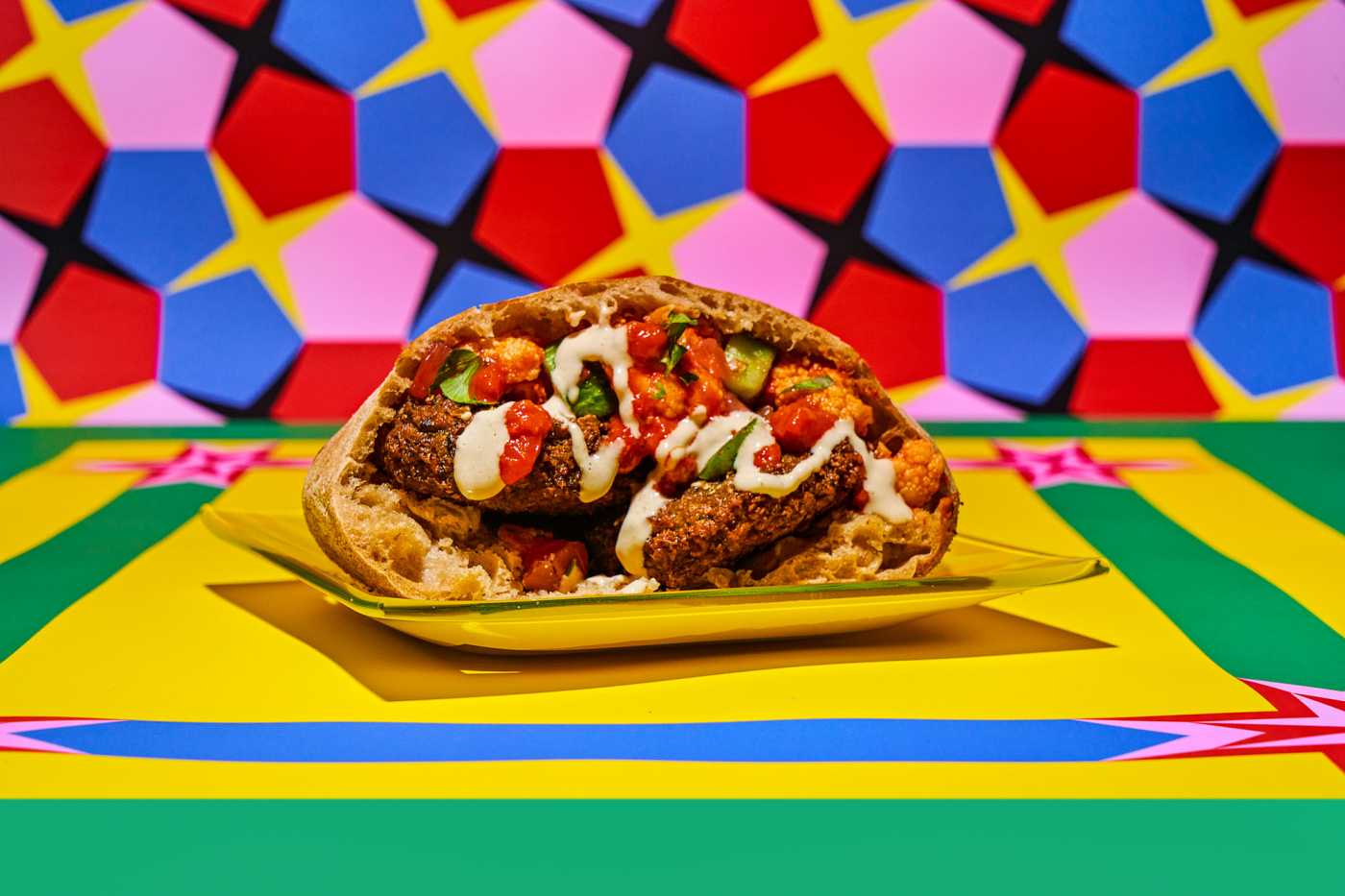
A zed, two noughts, and more | Zooba, Cairo
David J Constable explores the Egyptian capital, and finds the essence of Cairo in a single room and several amazing dishes

David J Constable explores the Egyptian capital, and finds the essence of Cairo in a single room and several amazing dishes

The night-time journey from the airport to my hotel was treacherous and filled with unexpected adventures. It was a Friday night in Cairo, just after midnight, so one might expect a party crowd and city disruptions, but these teeming roads: the police sirens and local wailing stragglers; tyres alight, smashed mopeds, a dead dog. This isn’t anyone’s rosy idea of the ancient capital. I lowered the car window and breathed in the city air, a pungent mix of gasoline and ripe river smells. The realities of a weekend night in Cairo are not the postcard image the Tourism Board hopes to promote, but it is what feeds into the city, helping create this bulging metropolis, which emerged from the sands as impressively as Persepolis.
Zooba is ranked an impressive ninth place in this year’s MENA 50 Best Restaurants list and first in Egypt.
If you have never been to Cairo, then you might retain the halcyon ideal of history lessons and school textbooks, the pointy-tipped monoliths and locals riding Uber camels. But Cairo 2023 is a bustling and hazy place, in which pedestrians think themselves immortal and will cause a highway pile-up just to cross the road. The city even has its own Instagram filter. Go to Stories, and swipe right three times. I’ll give you a moment. It is a squinty, sweat-stained hue, isn’t it? A gritty, fuzzy blast of grainy sandstorm scenery.
Anyone who has followed Egyptian politics will know that the wounds run deep; several thousand years deep, in fact. And things continued to bubble beneath the surface, temporarily healing until the scab was ripped off in 2011 when the Revolution spread as violent marchers demanded the overthrow of President Hosni Mubarak. And Cairo is still suffering. There appears to be a blood-boiling, teeth-grinding, pissed-off population at street level, banging on car windows and walking in front of traffic, cursing as though it’s your fault your car is on the road. It is also a capital on a clock.
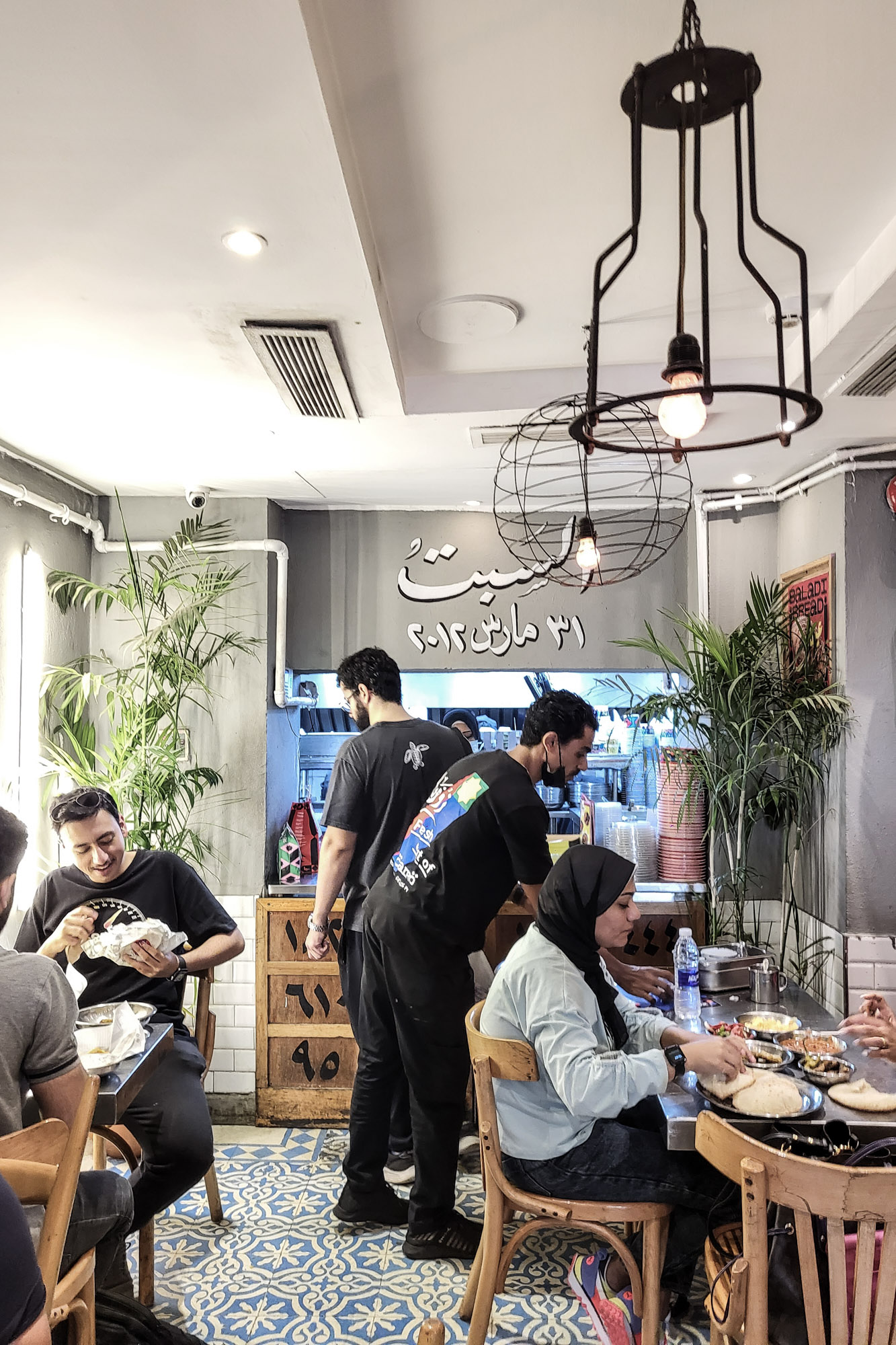
Zooba, Cairo
Soon, a new multi-billion capital will emerge, just 28 miles east on a swath of desert equal to the size of Singapore. A space of once awe-defining emptiness is slowly being revealed by sprouting malls and air-conditioned condominiums; a new city hot enough to melt the silicone implants of its wealthy soon-to-be residents. But what will become of old Cairo? No one really knows, but there is serious investment pouring into the New Administrative Capital, which is a decidedly un-sexy name for the next in a series of historical desert kingdoms to rise from the Sahara sands. Big Sandy would be a much more fitting name, but someone informed me that it is already taken and is located in Tennessee, one of the many states in America that are not near the coast and do not have any sand. Go figure.
While Cairo holds on to the vestiges of its capital status, there are those patriotic city unifiers who seek to promote not simply its history and wonders, but the food, too. They are, for all intents and purposes, foodies. Yep, they are everywhere. Food culture has become a way of navigating through civic differences, with chefs eager to bolster and share Egyptian recipes and home-cooked meals hoping to establish food tourism. Reflecting and surveying the neighbouring landscape, it is hard to deny the impact that food tourism has had on the economies of, say, Turkey, Greece, Israel, Jordan, and even Saudi Arabia, plus the increasing intrigue that has landed on petrodollar Dubai and the UAE. This emergence of explorative and celebratory food culture could attract the same level of international curiosity. Time will tell in which direction the country pivots, but for the good of Cairo, let’s hope it is the latter, except better – Dubai remains a holiday resort for footballers and a perpetually bright backdrop for smug Influencers.
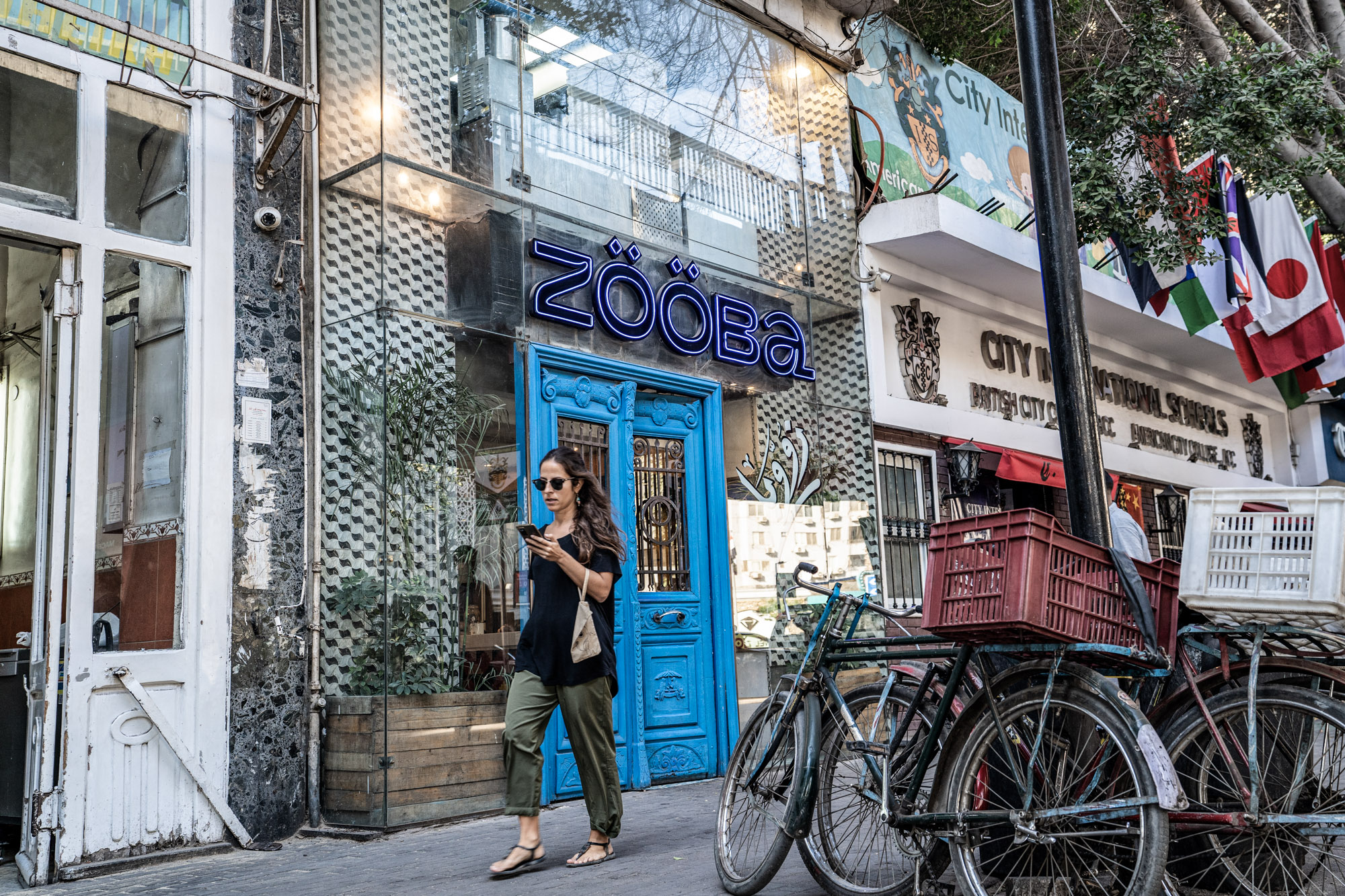
Zooba, Cairo
There is a growing interest in regional food and homegrown chefs among this new greedy generation of Egyptians that came to fruition post the revolution. One company to emerge from this was Flavor Republic, which defines itself as a “tribe of creatives driven by their love for food, art and the narratives that surround them.” And that is why I was in Cairo, a flight and a hotel reward in advance for a little ink.
Hoda El Sherif and Sherif Tamim are company co-founders and launched the first Cairo Food Week this past June. The success of the event was in its ability to gather international chefs – including Massimo Bottura, Mitsuharu Tsumura, Himanshu Saini, et al. – and global food writers together within a brief timeframe while pairing them with local chefs – Mostafa Seif, Omar Fathy, Mohamed Sherif, et al. As the country bobs in the swell of turbulent politics and a disastrous global PR image – the day I left, news broke of a shark eating a tourist near a beach in Hurghada, and a few days later, a boat off the coast of Marsa Alam caught fire, killing three British tourists – it is the hope that food can go some way to heal and bind a city.
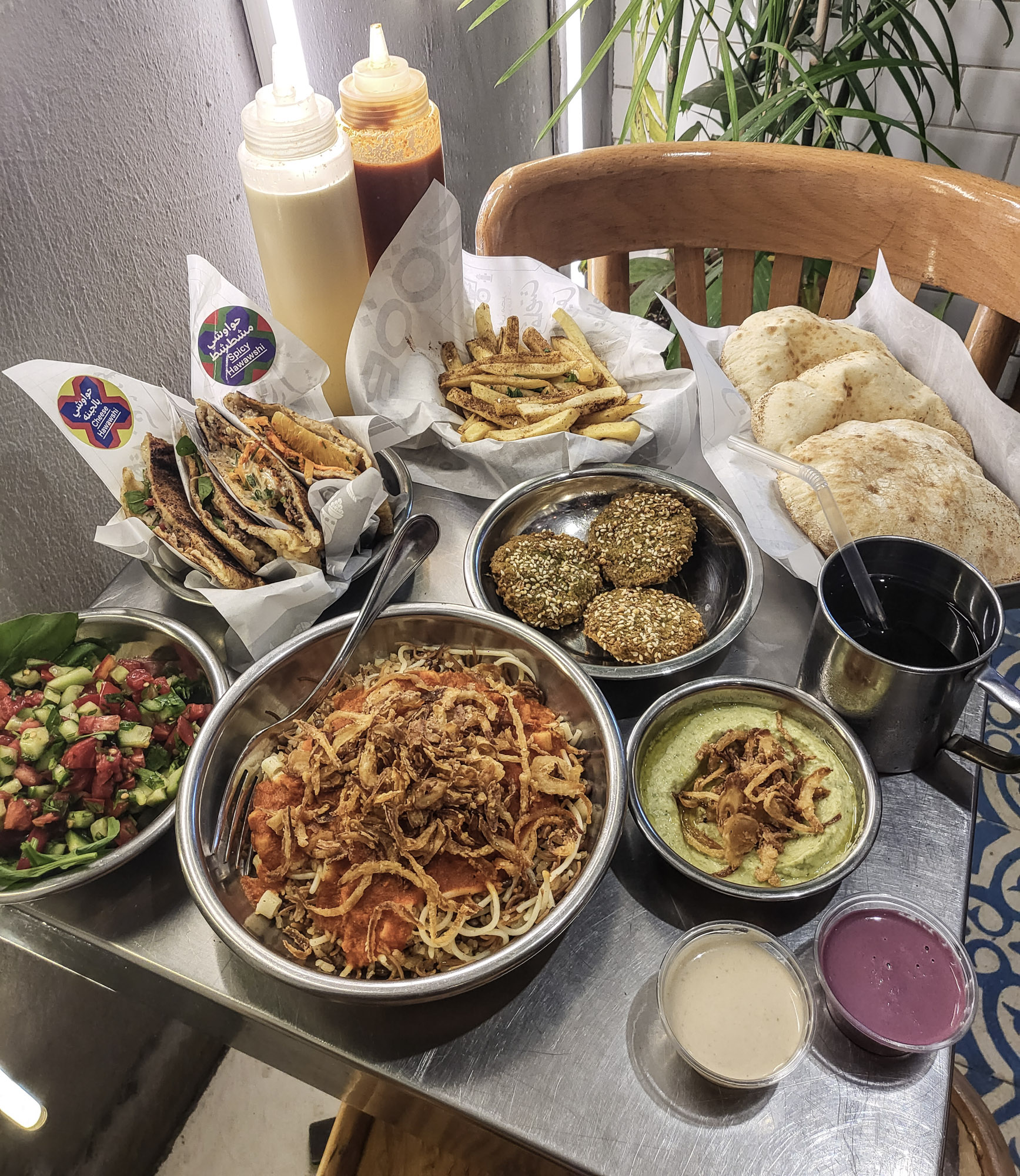
Zooba, Cairo
Jay Rayner once wrote about “The End of Civilization as we know it” in which he discussed an essay by the scholar and soldier, General Sir John Glubb, who discusses the collapse of apparently impregnable empires. When you think of Egypt, the same uneasy history comes to mind; an age of enterprise leads to an age of affluence, followed inexorably by the age of decadence and then breakdown. Rayner states that in the death throes of once great civilisations, people pursue the illusion of happiness by indulging in conspicuous consumption, particularly in food and drink, “feasting and boozing was, for example, a particular feature of the Roman Empire before it fell apart.” And, dare I say, the Egyptian Empire, too. But Flavor Republic hopes Cairo can successfully spread the message of its comestibles and not simply survive but prosper once it eventually relinquishes the title as Egypt’s premier megalopolis.
While the city doesn’t have a thriving restaurant scene, street food and fast food pit-stops are cheap and plentiful, helping feed and sustain a working population for years. One of Cairo’s most popular restaurants stems from the street. Zooba is ranked an impressive ninth place in this year’s MENA 50 Best Restaurants list and first in Egypt. It boasts several local outposts with others in Riyadh and New York and is the street food of Cairo brought inside, bridging that gap between the daily working lunch and a seated restaurant meal. This creates the same community cohesion, but instead of congregating around a park bench or sitting on a busy curb, you are swapping the bangarang of traffic for the contented prattle of happy tables and syncopated burbling of restaurant white noise. All successful dining rooms have a particular frequency of clamour, it is the whir of the masses, the sound of success.
During a lively lunch at the Zamalek branch, small metallic bowls came and went, and shiny tins of varying sizes quickly consumed the table, a non-stop procession of heavy, exotic dishes. We had hummus and harissa with pan-seared beef liver, pickled vegetables, Rumi cheese with black olive paste, molokheya soup, a wonderfully made falafel stuffed into warm aish baladi bread, a globular dish that was fried eggplant, but was a little too chewy, and lots of dishes with fava bean which they favour over chickpea, all dabbed with the ointment of tahini and lots of tangy pickled lemon. When I asked for sparkling water, which they did not have, one of the staff offered to go down the road to get me one, which I appreciated. Now that is service.
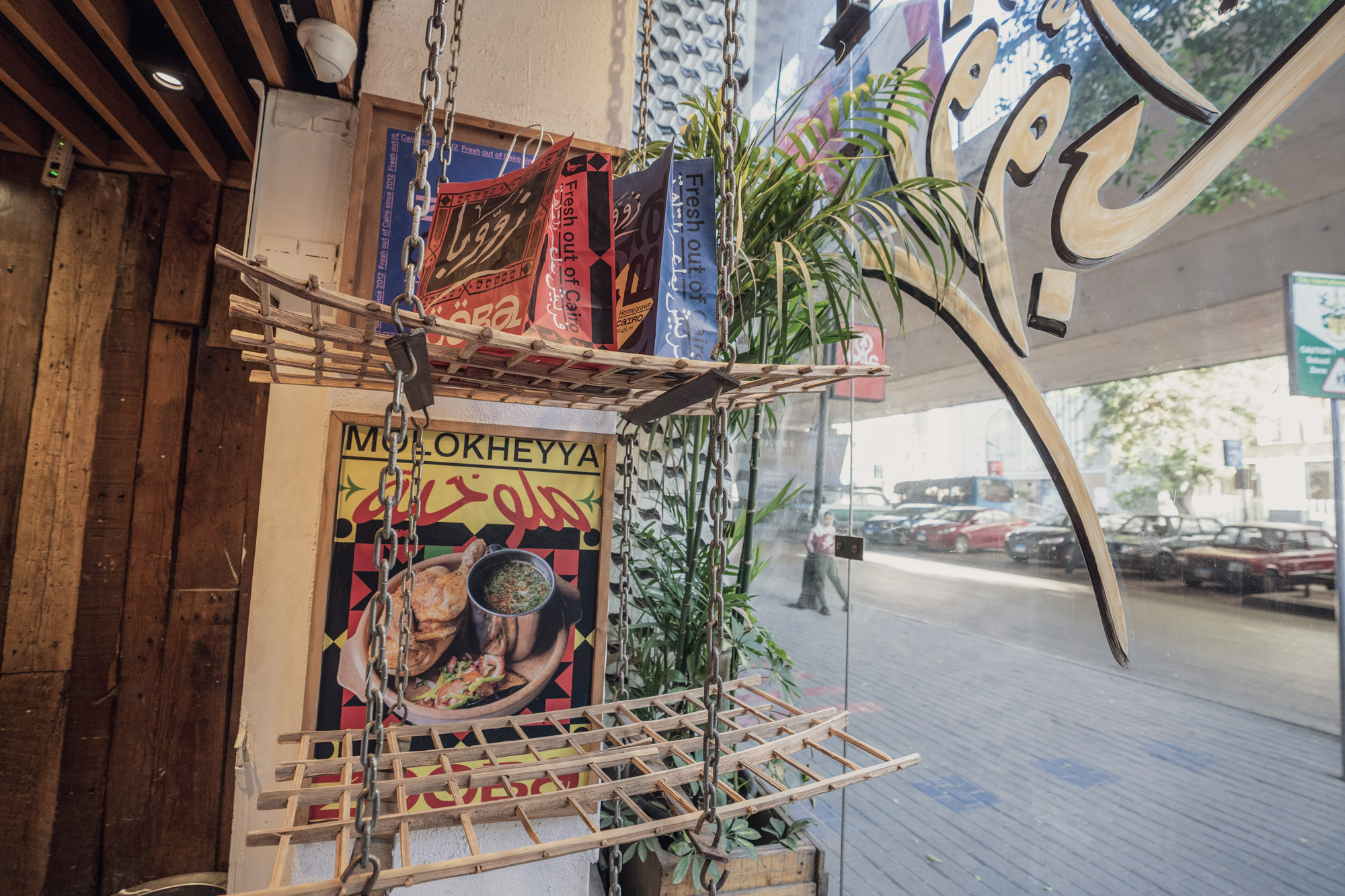
Zooba, Cairo
I counted five male chefs in the small kitchen. All in black uniforms and wearing those translucent rubber gloves, like diligent surgeons. Almost everything they occupied themselves with revolved around takeouts for the working Egyptian, scooping spoonfuls of cheap koshari (about £1.50 a serving) into cardboard boxes for delivery. Koshari is a traditional staple and everything that is wrong with Egyptian food. Wheat, beans and fruits are grown in abundance, and figs, dates, freekeh, legumes and tomatoes, too, plus the Nile is filled with perch, but the most popular recipe is a problematic amalgam of pasta, fried rice, vermicelli and lentils, garnished with chickpeas and crispy fried onions, like some drunk student’s late-night construction.
Reading cookbooks and online blogs, I discovered that koshari might have been invented by French settlers in the 19th century as a veggie dish called couches de riz. Other outlets even have the gall to blame the British, claiming that, as colonists of both India and Egypt, soldiers brought the Indian dish khichdi with them, which was then adapted at the hands of Egyptian soldiers and citizens. Whatever the truth, it is a sodden starchy muddle, the carbo pickings of other nations, with just that hint of farmer’s armpit.
Evident here by the calamity in the kitchen and the popularity of Zooba’s takeout options – koshari is, by far and away, their most popular order
While some value the handcrafted product or the organically grown tomato or the undeniable pleasures of eating a carefully prepared 12-hour slow-cooked lamb leg around a table with friends and family, there remains an even greater population who value the time they gain in not cooking or shopping. Evident here by the calamity in the kitchen and the popularity of Zooba’s takeout options – koshari is, by far and away, their most popular order. However, an excellent beef shoulder vermicelli mixed with a zingy tomato salad and hibiscus juice for 360 Egyptian Pounds, roughly £9, is a great option for those who want their carby-mix in a takeaway box. Nevertheless, a quid-fifty koshari is unbeatable.
This is food from the old Nile, a synthesis of mother-made, street-sold food that is the legacy of a lot of vagrant people who eat and talk with both their hands and their mouths. It is tasty food, sharing food, food with sentimentality. This now-once capital is floundering and sinking into something dire, but in the hellishly hot kitchens and the offices of Flavor Republic, a brigade of steadfast foodie warriors believe that food is the answer, the nation’s band-aid, its remedy. And it just might be. Because of Flavor Republic and a new breed of patriotic fighter chefs, old Cairo and the culinary reputation of Egypt might stand a chance.
While the ancient capital battles to stay relevant alongside the soon-to-be-revealed, its restaurants remain trapped between appeasing restaurateurs and investors and establishing a new culinary revolution. But, much like the city, the hospitality industry finds itself caught up in a murky age. That said, from those residents I met, there appears to be the correct gastronomic scaffolding in place for a productive and celebratory future. Politically, though, I don’t have the foggiest. But then, that might just be because it is so difficult to see through the fuzzy blast of grainy sandstorm scenery. C
Zooba, 16 26 July St, Al Gabalayah, Zamalek, Giza, Egypt
zoobaeats.com